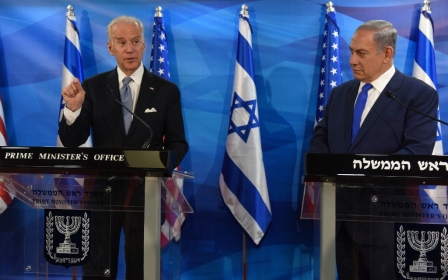US lawmaker reignites effort to curb presidential war powers

US Congresswoman Barbara Lee, the only lawmaker to have voted against the invasion of Afghanistan, is renewing a legislative push to pass a resolution that would limit the White House's ability to wage war.
In the run-up to the 20th anniversary of the US invasion of Iraq, Lee, along with anti-war groups and other lawmakers, is mobilising support to repeal the resolution that paved the way for the military intervention, the 2002 Authorization for the Use of Military Force (AUMF).
During a webinar on Wednesday evening hosted by anti-war advocacy groups, including Win Without War, the Friends Committee on National Legislation (FCNL) and Afghans For A Better Tomorrow, Lee said that since 2001, more lawmakers have learned "not to give any president the authority to wage war, for whatever reason, in perpetuity".
"It's unfortunate that we've had to go 20, 21 years in this, this fight to repeal these authorisations that should have never happened," Lee said.
The AUMF is a resolution passed by Congress that gives the president permission to wage military action, without the need for Congress' approval, as laid out in the specific terms set in the measure.
New MEE newsletter: Jerusalem Dispatch
Sign up to get the latest insights and analysis on Israel-Palestine, alongside Turkey Unpacked and other MEE newsletters
There are currently multiple AUMFs active: a 1991 AUMF and a 2002 AUMF that were both for Iraq; and a 2001 AUMF that gives the president the ability to wage war against the perpetrators of the 9/11 attacks.
The authorisations have been continually used by the past four administrations to launch military campaigns and strikes across the Middle East. The 2002 AUMF was used by the Donald Trump administration to assassinate Iranian General Qassem Soleimani.
The 2002 AUMF is close to being repealed, with the House in July voting in favour of revoking the authorisation and companion legislation in the Senate gaining bipartisan support.
"We're close. Now we're in the Senate with Senator [Tim] Kaine working and we've got to find 10 Republicans," Lee said.
The repeal also has support from the Biden administration, with the White House issuing a policy statement noting that it supports Lee's bill that would repeal the 2002 AUMF.
"There is strong bipartisan support for repealing the 2002 Iraq AUMF in both the House and the Senate. There are 11 Republican cosponsors of a Senate bill to repeal the 2002 AUMF," Heather Brandon-Smith, a legislative director at FCNL, said during the webinar on Wednesday.
"So that's enough to overcome a filibuster, and what's more, the White House has even come out in support of this repeal."
A difficult path to end 2001 AUMF
In a separate and more difficult battle, the congresswoman is also working to repeal the wider-ranging 2001 AUMF, passed in the aftermath of the 9/11 attacks.
That effort has been met with a more divided Congress and there has been no sign of support from the Biden administration.
The open-ended nature of the 2001 AUMF has allowed multiple presidents to wage war against a number of groups, including al-Qaeda, the Taliban, al-Shabab, and Islamic State (IS).
It has been applied in countries including Afghanistan, Iraq, Syria, Libya, Somalia, and Yemen.
"It's been used over and over and over again for military attacks, for assassination attempts, not connected anywhere near to 9/11," Lee said.
"We have to think about the losses of people in the region and how their lives were shattered as a result of this."
A 2021 report from Brown University's Costs of War Project found that the US-led global war on terror has led to the deaths of nearly one million people, and cost more than $8 trillion.
In January 2021, Lee introduced a bill to repeal the 2001 AUMF, and since then it has gained more than 90 co-sponsors. The resolution issues a sunset provision for the AUMF, forcing it to expire after a period of eight months.
The congresswoman says that is more than enough time for the White House to create a narrower, more restricted version that Congress could agree on.
"You can't tell me that if the President needs to go to war or use force, eight months is not enough time for Congress to debate and authorise a new authorisation," Lee said in an interview with the online magazine Responsible Statecraft.
"We passed the 2001 AUMF in three days, so you can't tell me that Congress can't come up with something if the President needs it."
Still, the measure does not have enough support to pass out of the House, let alone make it out of the Senate.
Middle East Eye delivers independent and unrivalled coverage and analysis of the Middle East, North Africa and beyond. To learn more about republishing this content and the associated fees, please fill out this form. More about MEE can be found here.





